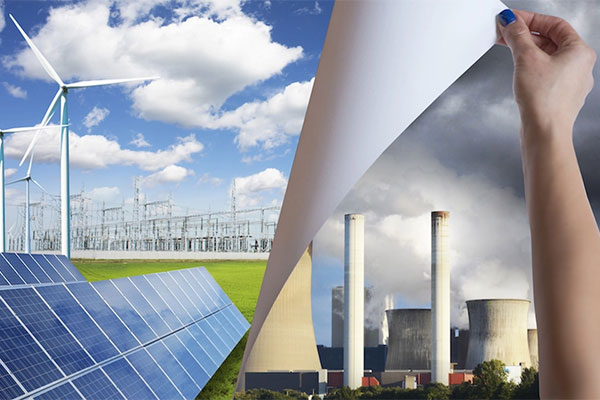- A new paper explores the reasons behind decreasing CO2 emissions in a group of 18 developed economies that have decarbonized over the period 2005–2015.
- The research team analyzed the reasons behind changes in CO2 emissions in countries where emissions declined significantly between 2005 and 2015.
- The findings, published in Nature Climate Change, show that the fall in CO2 emissions was mainly due to renewable energy replacing fossil fuels and to decreasing energy use.
Efforts to cut emissions of carbon dioxide (CO2) and tackle climate change in developed economies are beginning to pay off according to research led by the Tyndall Centre at the University of East Anglia (UEA).
The study suggests that policies supporting renewable energy and energy efficiency are helping to reduce emissions in 18 developed economies. The group of countries represents 28 percent of global emissions and includes the UK, US, France and Germany.
The research team analysed the reasons behind changes in CO2emissions in countries where emissions declined significantly between 2005 and 2015. The findings, published in Nature Climate Change, show that the fall in CO2 emissions was mainly due to renewable energy replacing fossil fuels and to decreasing energy use.
However, the decrease in energy use was partly explained by lower economic growth reducing the demand for energy following the global financial crisis of 2008-2009.
Significantly, countries where CO2 emissions decreased the most were those with the largest number of energy and climate policies in place.
The researchers compared countries with declining emissions with countries where emissions increased. They found that policies encouraging energy efficiency were linked to cuts in emissions across all countries.
They also found that policies that encouraged renewable energy were linked to cuts in emissions, but mostly in developed economies with decreasing emissions only, not elsewhere.
The data suggests that efforts to reduce emissions are underway in many countries, but these efforts need to be expanded and enhanced to limit climate change to well below 2 °C of warming, in line with the Paris Agreement.
The authors argue that “untangling” the reasons underlying recent changes in emissions is critical to guide efforts to tackle climate change.
Lead researcher Prof Corinne Le Quéré, of the Tyndall Centre for Climate Change Research at UEA, said: “Our findings suggest that policies to tackle climate change are helping to decrease emissions in many countries. This is good news, but this is just the start. There is a long way to go to cut global emissions down to near zero, which is what is needed to stop climate change. Deploying renewable energy worldwide is a good step but by itself, it is not enough, fossil fuels also have to be phased out.”
Dr. Charlie Wilson, also from UEA, said: “New scientific research on climate change tends to ring the alarm bells ever more loudly. Our findings add a thin sliver of hope. It is possible for countries to peak and then declines their emissions year in year out.
“Eighteen countries so far have shown us how concerted policy ambition and action on energy efficiency, renewables, and climate targets can work. Now we must make sure these early precedents become the rule, not the exception. This is a huge global challenge.”
Global CO2 emissions would need to decrease by about a quarter by 2030 to limit climate change well below 2 °C, and to decrease by half to stay below 1.5 °C. Global CO2 emissions increased by 2.2 per cent per year on average between 2005 and 2015.
Co-author Dr Glen Peters, of the CICERO Center for International Climate Research in Oslo, said: “Global carbon dioxide emissions rose in 2017 and 2018, suggesting that the rapid rollout of renewable energy has so far not been sufficient to arrest the growth in fossil fuel use.
“Energy and climate policy has been successful at supporting renewables and energy efficiency, but to realise meaningful emission reductions supporting policies are needed to penalise the emission of carbon dioxide.”
















Comments